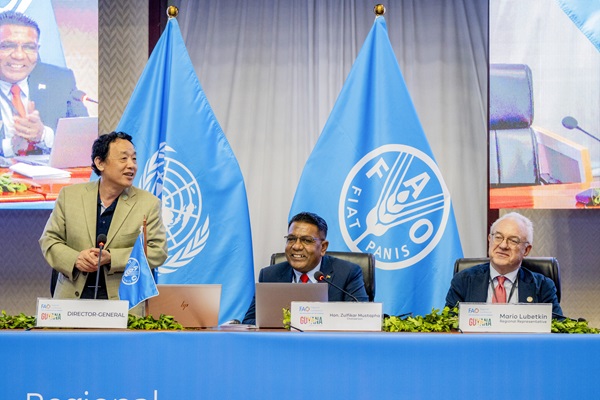
Georgetown, Guyana – The 38th Regional Ministerial Conference for Latin America and the Caribbean of the Food and Agriculture Organization of the United Nations (FAO) ended today with a renewed commitment to FAO's Strategic Framework 2022-31 and four regional priorities that will guide the work of the Organization for the next biennium.
Closing the high-level gathering, FAO Director-General QU Dongyu thanked Guyana for hosting the meeting and said that the 33 member states in the region had come together to establish a shared vision for the future, to achieve nutritious food for all, for today at tomorrow.
“This has been a unique opportunity to discuss challenges, opportunities, and the different paths we can follow. Deep and fruitful discussions between Members and FAO highlighted critical areas of consideration, covering a range of topics to advance the transformation of agrifood systems based on country context and needs and the implementation of the 2030 Agenda,” he said.
Qu praised the region’s commitment to embracing the Four Betters outlined in the FAO Strategic Framework 2022-31 – better production, better nutrition, a better environment, and a better life, leaving no one behind, now reflected in the agreed regional priorities: transforming agrifood systems through the promotion of more efficient, more inclusive, and more sustainable production; ending hunger and achieving food security and nutrition; promote sustainable management of natural resources and adaptation to climate change; and reducing inequalities and poverty, while promoting increased resilience.
“I am filled with a profound sense of gratitude and optimism. Over the past four days we have witnessed remarkable discussions, collaborations and insights that have undoubtedly enriched our collective understanding and efforts,” said Mustapha Zulfikar, Minister of Agriculture of Guyana and Chairman of the Conference.
Qu outlined some of the key FAO initiatives and tools discussed during the conference to support Members in the transformation needed, including the Hand-in-Hand Initiative, the Blue Transformation approach, and the Global Roadmap on Achieving SDG2 without breaching the 1.5C threshold. He also underscored the importance of building resilience, particularly for Small Island Developing States (SIDS), in the face of climate-related challenges.
"Latin America and the Caribbean is one of the few regions that have demonstrated progress in the fight against hunger, reducing the figures of undernourishment”, he said, acknowledging the region's achievements while urging continued action to address inequalities and climate impacts.
The Director-General concluded by expressing FAO’s commitment to achieving tangible results in the region by 2026.
Over four days, the Ministerial Conference provided a platform for leaders to discuss challenges, opportunities, and pathways to achieving food security and sustainable development in Latin America and the Caribbean.
Through Ministerial Roundtables, delegates focused on how to advance fisheries and aquaculture; harness trade as a strategic driver to reduce hunger and malnutrition in the region; and address challenges of the water-forest-biodiversity-soil nexus in the context of the climate crisis. The agenda also included high-level special events focused on how science and digital innovation can bolster family farming, the need for agrifood systems transformation in the region's SIDS, investment targeting through FAO's Hand in Hand Initiative, and foresight drivers and triggers relevant for Latin America and the Caribbean.
The 39th Session of the FAO Regional Ministerial Conference for Latin America and the Caribbean will be held in Brazil in 2026.